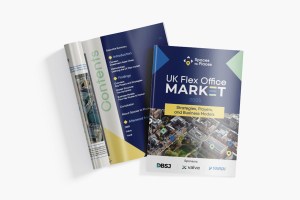What do flexible workspace operators need to consider when expanding their footprint?
At the recent GCUC conference, James Rankin and John Williams presented the latest insights on the coworking and flexible workspace sector. Despite the demand for the industry increasing by 12% in the last year, market supply has risen by a mere 5%.

With businesses continuing to make the move to flex and growth remaining consistent, there is question over whether the market can keep up with demand. According to The Instant Group, if just 10% of current leased office tenants moved to flex, the flex market in England and Wales would need to grow by 40% to deliver the needed supply.
Yardi’s Justin Harley hosted a discussion about what flexible workspace operators should consider when expanding their footprint alongside industry experts including leading global providers, WeWork, Orega, 2-work and g8 Consult.
- David Kaiser, head of real estate for WeWork
- Gal Leslie, sales and marking director for 2-Work
- Zach Douglas, CEO and co-founder of Orega
- Douglas Green, managing director for g8 Consult
Expansion: Where to start?
With growth at the forefront of market concerns, Harley opened the discussion by asking the group what they consider when expanding and taking on new locations.
The industry:
Despite their individual offerings, all panellists stipulated the importance of understanding your place in the industry and where demand is. “In an extremely fragmented market, businesses must establish the area that they want to address and what they want to achieve before expanding,” said David Kaiser, head of real estate for WeWork. “Once you understand this, you then must understand the product you can offer and where that fits into the market.”
The location:
Next, follows one of the biggest considerations, location. “It’s imperative to understand all the metrics you can about the location including the demographic, the demand and the surrounding competition,” said Gal Leslie, sales and marketing director at 2-Work. “This approach was extremely successful when implementing our space in Leeds.”
The business model:
In addition to looking at the overall market comes the need for a robust business model which Zach Douglas provided insight on. “When considering new locations and growth, it’s important to factor in the unexpected impact of things such as cost and capital inflation. In doing so, you put yourself in greater stead for a sustainable business model for you, your members and your landlord.”
Growth vs Challenges: What lessons have been learned?
With business growth comes challenges and pitfalls. Harley asked the panel about their experiences and the lessons they have learned. Collectively, the panel agreed that some of the biggest pitfalls occur when due diligence is not performed properly.
“For us at WeWork, location is the most important driver when it comes to expansion. Each location comes with different metrics and therefore, different needs. For example, London is heavily reliant on transport accessibility and so, a tube station is a key decision-maker,” said Kaiser. “Whereas when looking at regional cities such as Cambridge, bike networks are the bigger priority for our members. Regardless of the location, understanding your micro market and what is required to enhance the entire working environment is fundamental.”
As CEO of Orega, regional experts in the UK, Zach Douglas provided some great insights from a capitalisation standpoint.
“Growth for growth’s sake never ends well, particularly with the current economic state. Should you feel prepared and decide to expand, ensure you conserve enough cash so that your business remains capitalised,” said Douglas. “Whether economic impact, lack of due diligence or quite simply, a location, no longer works for a business model. No one wants to fund a business that is failing.”
With capitalisation in mind, Douglas underlined the importance of openness in the industry. “It is fundamental that we continue to share our data more openly. In doing so, the funding business will be more trusting of us and take us more seriously.”
Operating models: Which one is the best for you?
When it comes to expansion in the flex market, there are several different avenues to explore. Harley continued the discussion by asking the experts their thoughts on the varying business models available within the market including owner/operator, joint venture management agreements and lease management.
Owner/Operator:
This model is great for commercial real estate companies who are experts in acquiring assets but admittedly don’t have knowledge of the intricacies involved with flexible space management. However, Douglas provided insight that, “Acquiring the asset is extremely capital intensive and takes much longer to complete.”
While it remains a lesser-used option, acquisitions are a powerful way of cementing a foothold in a growing industry.
Joint Venture – Management Agreements:
This popular operating model is a partnership between a landlord and a coworking or flexible workspace operator. This is an intuitive way for property owners to utilise their assets without learning the complexities of flex space.
As managing director for g8 Consult, a leading provider of transactional advice in the flex sector, Douglas Green provided some great insights on this.
“Over the past 12 – 18 months, most of my work has been with management agreements. Given the current volatility of the market, it seems to be the chosen route of expansion today to give operators a competitive edge as they develop and expand,” said Green.
This model sees reduced risk of starting their location from scratch and offers prosperous benefits to the landlord involved, as supported by Leslie. “It’s important for landlords to understand the value that you bring to their assets. Essentially, your flex space acts as an incubator for future investment in their buildings.”
Lease Management:
For operators who don’t own the asset, attaining a building through a traditional lease is a great way to enter the flex market.
Despite the panel agreeing that this model allows for quick entry into the market, operators who take on this model will need multiple revenue streams to compensate for high turnover rates. And with long multi-year leases, selling short flexible memberships will mean margins will be tight.
Douglas added, “With the lease model, you don’t have control over your costs. Some operators experience an increase from £30 to £55 per square foot over 5 years, which is nearly doubling your real estate costs”.
One last bit of advice…
Bringing the session to a close, Harley asked the panel what their last bit of advice would be when considering new locations and growth in the flex sector.
David Kaiser
“Stick to your business plan and be prepared to adapt to changing circumstances.”
Zach Douglas
“You will be more defined by the opportunities you don’t go forward with than those you do.”
Gal Leslie
“Be open-minded to opportunities and consider BTR and retail repurposing.”
Douglas Green
“Don’t negotiate until you are in the right place.”
Real estate grows on Yardi
Yardi’s end-to-end solution can help you transition from commercial to flexible working and create an all-in-one platform for your mixed portfolio. Yardi’s technology allows you to streamline property management and fully automate investment accounting, performance measurement and financial reporting to make better, faster and more informed decisions.
Yardi Kube is specifically designed for flexible workspace and coworking. With our single connected solution, including software and mobile apps, you gain an end-to-end platform that allows you to automate your space with a flexible workspace management platform. You can easily manage prospects, members and operations, which helps to simplify daily operations with an all-in-one solution for coworking locations and flexible workspaces. With Yardi Kube IT Management, you can provide an enhanced customer experience with a reliable Wi-Fi network and manage your IT infrastructure with ease.
See how you can automate your space with Yardi’s all-in-one flexible workspace solution.
Follow Yardi Kube on LinkedIn for the latest news, customer stories and blog posts.




